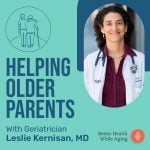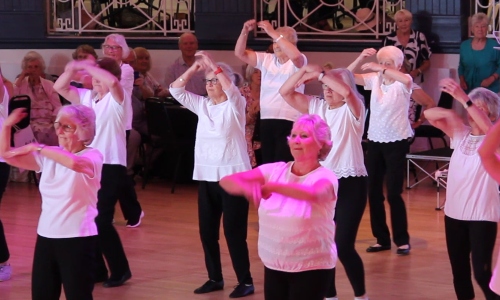

Q: My loving, Jewish mother is 92 and has turned into a rude, abusive foul-mouthed woman who I no longer recognize.
She’s in relatively good health and amazingly lives in the same house I grew up in. She has an aide during the day. She won’t leave the house, treats the aide poorly and last weekend cursed out my very patient spouse. We’ve been getting 5 calls a day such as ” I’m having a heart attack; no one will tell me whether recycling comes today”!
I know she has early signs of dementia. Her cardiologist tells me not to take it to heart and this is not the same woman who raised me. She won’t go to the JCC adult programs, complains about being lonely at night, yet hangs up on me when I tell her we can get an aide at night or sell the home and let her live in a facility with women her age, etc. She threatens to call the Police if someone comes to her home at night. I have a POA but don’t want to rob her of her independence at 92. I try to tell her to speak nicely to the aides, myself, my spouse, but she says ” I don’t remember or I must have reacted to something someone did or said.”
I feel guilty as I’m not spending as much time with her as I would like, but it’s a matter of survival. Jewish guilt is thrown about with impunity and I can’t tell whether she’s being manipulative and obsessing over bullshit ( “oh my God the outside light may burn out tonight” ) or she really can’t control herself. Her aide is a lovely human being but my mom orders her around like a slave. Who is this woman? I’m torn, anguishing over what to do and am doing nothing but try to correct her inappropriate behavior and language. I wanted to take her to a geriatric psychiatrist but she refused to go. Medication to calm her down is dangerous per the MD as she could fall, etc.
What should I do? I’m at my wits end.
Dr. K’s answer:
Wow, difficult situation but unfortunately not uncommon.
You say your mother has early signs of dementia, and it is true that “personality changes” can be due to an underlying type of dementia, such as fronto-temporal dementia or Alzheimer’s, especially if a family notices other changes in memory or thinking abilities.
But it doesn’t sound like your mother’s been clinically evaluated for dementia, and you don’t say whether this has been brought up with her primary care doctor.
How to Get Signs of Dementia (or Personality Changes) Evaluated
To get help with this situation, I would recommend you find a way to get a least a preliminary medical assessment done for dementia.
If you are wondering what is the difference between dementia and Alzheimer’s disease, or want to know more about how they are diagnosed, I explain that in this video:
In principle, this can be done at a primary care provider’s (PCP’s) office, and it might be easier to arrange that visit than it is to get her to see a geriatric psychiatrist.
In practice, primary care doctors – and cardiologists, for that matter – routinely wave off dementia assessments in people your mother’s age, saying things like “it’s not necessary” “there’ll be nothing to do” “don’t make her upset” and “don’t take it personally, it’s the disease and not your fault.” (This last statement is generally true, but that doesn’t mean we should skip the assessment!) Also, many primary care doctors may not be quite sure just what to do, in order to complete a preliminary assessment.
Fortunately, you can improve your chances of getting a helpful assessment by familiarizing yourself with how dementia is diagnosed, and then coming prepared with good information regarding your mother’s abilities and challenges. For instance, you can make note of how your mother is doing regarding these 8 behaviors that may correspond with Alzheimer’s.
This article I wrote can also help: Cognitive Impairment in Aging: 10 Common Causes & 10 Things the Doctor Should Check.
You can also review this article about dementia diagnosis which I wrote for family caregivers. Do bear in mind that HIPAA does not prevent you from contacting her doctor ahead of time and relaying your concerns and your observations. I generally think it’s good to do this in writing, as it can be put in her chart.
You may, of course, be wondering why you should bother getting her checked for dementia, such as Alzheimer’s disease. You may also be worried that a diagnosis will distress or upset her. In truth, it might upset her in the short term. Still, in the long run, getting her assessed for dementia is likely to bring you both a lot of benefits.
The Many Benefits of Pursuing a Dementia Diagnosis
For your mother, an assessment for cognitive changes means she’ll be checked for other health problems that might cause personality or thinking changes. After all, it’s possible that the problems you’re observing are not due to dementia.
It’s also common for dementia to be exacerbated by additional problems – like electrolyte imbalances, medication side-effects, untreated pain, or even constipation — which can be treated, even though a disease such as Alzheimer’s can’t be cured. So you really want at least a preliminary clinical dementia evaluation to be completed.
If your mother ultimately is deemed to have dementia, you want that to be in her medical chart. That’s because this diagnosis has implications for how to manage the care of any other health problems she has. (For example, the doctors should not simply provide verbal instructions to her for her healthcare, as they usually do to patients. And they should do things like simplify her medications if possible.)
A dementia diagnosis will also make it easier for you to get help as a family caregiver. Difficult behaviors are often managed with medications, but it’s true that these generally increase fall risk, so they should be avoided. If you are concerned about her behavior, this article will explain the pros and cons of the available medication options: 5 Types of Medication Used to Treat Difficult Dementia Behaviors.
What is best is for family caregivers – and paid home caregivers – to learn better dementia behavior management techniques, and dementia caregiving coping strategies. I’m afraid it’s pointless to try to reason with her and “correct” her behavior, that just doesn’t work with people who are cognitively impaired. But there are other approaches that can help, most of which start off by accepting the impaired person’s reality.
Plus, learning better ways to handle your mother’s behaviors can have a big effect on her wellbeing, and on yours. For you, learning better approaches will help you with the stress, anxiety, and guilt. This will make it more feasible for you to be present for your mother when you can, and that in turn will improve her wellbeing (even though she may not often sound as appreciative as you’d like). A 2013 study actually found that dementia caregiver coping strategies were associated with slower dementia progression.
Last but not least, a dementia diagnosis often helps a family focus on planning for further declines in decision-making and independence. This is obviously not easy, but trust me, things tend to go better later if families have done some planning earlier.
In other words, there is a lot to learn and do if you are, in fact, the son of an older woman who is changing due to dementia. A preliminary diagnosis is an important medical first step, and will make it easier for you to get help coping, and get help learning skills to make the experience more manageable.
How to Get Help Coping with Dementia Symptoms
For help coping with the experience – whether it’s how to get your mom in to see the doctor, how to deal with the doctors, how to cope with your stress, how to manage her outbursts, how to plan ahead – I would recommend you try the following resources:
- Join a support group, either in-person or online. The Alzheimer’s Association and local memory clinics can be good sources of support groups.
- Talk to a professional trained to help people struggling with aging parents, such as a geriatric care manager (now known as an aging life care professional) or a senior care adviser.
- Read a few good books, as it’s hard to learn a lot by skimming web pages. For dementia, the 36-Hour Day is well respected, and I like Surviving Alzheimer’s a lot too. Or consider a course offered by your local Alzheimer’s Association. Another option would be dementia management videos, such as those by Teepa Snow. Pick whatever method of education works best for your style of learning.
- Remember to take deep breaths, and to take care of yourself. Dementia or no, helping an aging parent is usually a long journey. Building some daily walking and daily mindfulness practice into your day can make a big difference.
Good luck! Do get that dementia assessment and then get help learning to deal with her behaviors. It’s an effort but it will pay off in the long run.
You can also learn more about my approach to dementia care through my free online workshop below.
This article was last updated in August 2024.




